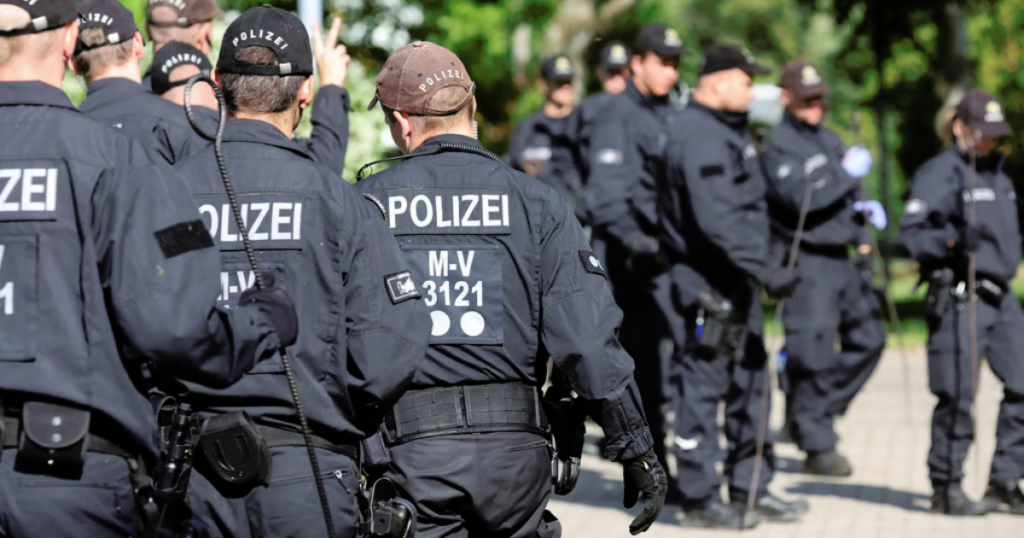More than 400 investigations have been carried out into right-wing extremist views or conspiracy theory convictions of employees of the German state police. Since four of the sixteen federal states do not currently provide statistics, the actual number is likely to be significantly higher. Uli Grötsch, the police commissioner of the German Bundestag, stated that the existence of these individuals posed a serious threat. It was rumored that members of the large Reich Citizens’ Movement were trying to recruit police personnel for their plan to overthrow the German government.
Der Umfang der Untersuchung
Thousands upon thousands of Germans demonstrated in cities across the country against the right-wing Alternative for Germany (AfD) party. Protests against the AfD took place in Leipzig and Dresden, two of the party’s more established electoral bastions in eastern Germany, as well as in Berlin, Munich and Cologne. While nationwide polls put the AfD ahead of the governing parties and in second place behind the largest center-right opposition bloc, protests against the far-right party gained momentum after investigative news site Corrective reported on January 10 that mass deportations of foreigners were discussed at a meeting of right-wing hardliners in Germany. One of the panelists was Martin Sellner, the head of Austria’s Identitarian Movement, who believes non-white immigrants are planning to displace Europe’s “native” white population. The claimed migration intentions are not party political, the AfD said.
Aufdeckung rechtsextremer Loyalitäten
Signs reading “No place for Nazis” and “Nazis out” were carried by demonstrators outside the German Bundestag in Berlin. Protest organizers in Munich reported that 200,000 people had gathered, but they had to cancel the rally early because of traffic jams. Katrin Delrieux, 53, told AFP news agency in Munich that she hoped the anti-right demonstrations would “make many people think again.” Frankfurt protester Steffi Kirschenmann said the demonstrations were “a signal to the world that we will not let this go uncommented,” according to Reuters. Authorities had to divert a protest march in Dresden, the capital of Saxony’s eastern region, where the far-right party dominates in the polls. The parade was extended to accommodate a “huge number of participants,” Dresden police said on social network X.
Bekämpfung institutioneller Voreingenommenheit
Business leaders also expressed their concerns. Joe Kaeser, chairman of the supervisory board of Siemens Energy, told Reuters that Corrective’s information brings back “bitter memories.” German President Frank-Walter Steinmeier supports the marches across Germany and sees them as a sign of solidarity against right-wing incitement. At a protest rally this weekend, Chancellor Olaf Scholz stressed that any proposal to deport both citizens and immigrants is “an attack on our democracy and therefore on all of us.” “Everyone must take a stand – for unity, for tolerance, for our democratic Germany,” he warned. In December 2022, police raids and the arrest of 25 of the 52 accused conspirators uncovered the Reich Citizens’ plot to overthrow the German government.
Wahrung demokratischer Werte
Among other things, the organization is said to have intended to break into the Berlin parliament, damage the country’s power grid and overthrow the federal government in order to seize control. There were even plans for certain individuals to temporarily take over important cabinet positions during the “takeover”. State and federal security authorities have been investigating potential radicals for years.
A 2022 study by the German Federal Ministry of the Interior found that 327 cases involved right-wing extremist activity. Also telling is the fact that anti-government right-wing extremist organizations like the Sovereign Citizens (discussed in more detail below) are not unique, and that their philosophies overlap with those of the white supremacist movement and other groups. Members of the Posse Comitatus, for example, were followers of the Christian Identity movement, whose “tenets include anti-Semitism and racism, but another key identity belief is that one should obey God’s laws, not human laws, and that the government’s blatant failure to do so is not lawful.” Crucially, many of the same core ideas are shared by anti-government and white nationalist groups, even if there are no connections between them.
Abschluss
Zusammenfassend lässt sich sagen, dass die Legitimität der Regierung direkt durch rechtsextreme regierungsfeindliche Überzeugungen in Frage gestellt wird, die auf selektiven Lesarten der amerikanischen Rechtsgeschichte und Verschwörungstheorien basieren und kaum oder gar keine sachliche Grundlage haben. Die Strafverfolgungsbehörden haben ihre Besorgnis über die regierungs- und strafverfolgungsfeindlichen Stimmungen einiger Seiten zum Ausdruck gebracht und sind sich der Bedrohung bewusst, die von Rechtsextremisten ausgeht. Diese Sprache richtet sich häufig an die Strafverfolgungsbehörden, um zu vermitteln, dass Radikale ernst genommen werden müssen. Aufgrund der zugrunde liegenden regierungsfeindlichen Ideologie besteht möglicherweise eine „überwiegend feindselige“ Verbindung zwischen Strafverfolgungsbehörden und rechtsextremen Bewegungen.


